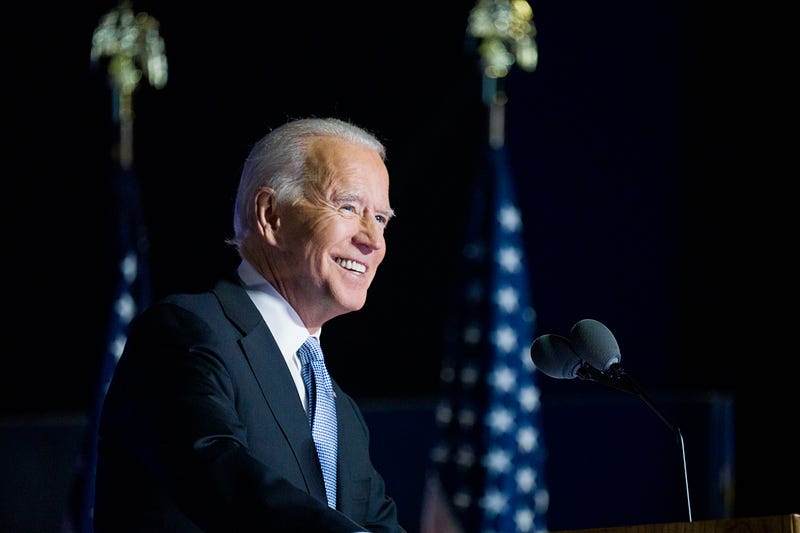Biden’s Climate Day brings a second wave of climate action
Welcome to Planet Week, where we highlight the last week of environmental news and what it means for our Planet.
Welcome to Planet Week, where we highlight the last week of environmental news and what it means for our Planet.
Last week, Cyclone Eloise hit Mozambique. The infamous Dakota Access pipeline lost a key appeal. And a polar vortex swept across the United States East Coast and Midwest.
In case you missed it, here’s what else happened around the Planet:
Monday, January 25
Ice loss is accelerating
A grim new report found we’re now losing 1.2 trillion tons of ice each year — an increase of 60% over the last two decades.
This acceleration is unlikely to stop, as glaciers, weakened by past melting, linger in increasingly warm waters. If that isn’t bad enough, another recent study suggests the global community has underestimated sea-level rise by “at least a factor of 2” The Washington Post has the full story.
Renewables overtake fossil fuels in Europe
Renewable energy became the primary source of electricity in Europe last year, finds a new report by Agora Energiewende and Ember. In 2020, total renewables accounted for 38% of electricity generation in the European Union, just edging out fossil fuels at 37%.
Wind and solar drove this growth, rising 9% and 15%, respectively. Coal, meanwhile, plummeted 20%. The fall of fossil fuels is part of a larger trend, but this is only the beginning of a transition to a green economy, said Patrick Graichen, director of Agora Energiewende.
“[L]et’s not be complacent,” Graichen said in a statement. “Post-pandemic recovery [programs] need to go hand-in-hand with accelerated climate action.” Read more in The Verge.
Tuesday, January 26
Most of the world sees climate change as an emergency
Nearly two-thirds of people around the world see climate change as an emergency, according to the world’s largest survey ever on climate change. Conducted by the United Nations Development Programme, the Peoples’ Climate Vote surveyed 1.2 million people across 50 countries.
To address the crisis, the majority of respondents wanted to see four policies imposed: conserving forests and land conservation; boosting solar, wind, and renewable power; enacting climate-friendly farming techniques; and investing more in green businesses and jobs.
“There is a groundswell of people that are saying even during a pandemic that climate change is an emergency and here’s how we want to solve it,” Cassie Flynn, UNDP’s strategic adviser on climate change, told Al Jazeera.
BlackRock pressures companies with climate goal
The world’s biggest investor (and one of the worst for the environment) is now pressuring companies to prioritize climate change. In his annual letter to CEOs, BlackRock Chief Larry Fink asked companies “to disclose a plan for how their business model will be compatible with a net-zero economy.” Since BlackRock controls nearly $9 trillion in global assets, its priorities become other companies’ priorities. As they say, money talks.
“When Mr. Fink makes what sounds like a request, in truth it is much more than that,” writes The New York Times. “BlackRock’s size gives it enormous influence: Mr. Fink can seek to oust directors of companies that he doesn’t believe are heeding his call, and he can dump the shares of companies owned by the firm’s actively managed funds.”

Wednesday, January 27
Biden’s Climate Day brings a second wave of climate action
U.S. President Joe Biden labeled Wednesday “Climate Day,” and with it came another wave of climate actions. For a newsletter that prides itself in brevity, Biden’s flurry of orders is making our jobs tough (a good problem to have).
That said, we won’t cover everything, but here’s some of what Wednesday’s 7,500-word executive order does:
Freezes new oil and gas drilling leases on public lands and waters and requests a review of existing leases. Note: This isn’t a fracking ban, nor does it halt production already underway.
Directs federal agencies to end fossil fuel subsidies, pushing them toward green technologies and infrastructure.
Lays the groundwork for green jobs, directing the federal government to obtain carbon-free electricity and zero-emission vehicles in line with last Monday’s “Buy American” order.
Prioritizes environmental justice, directing 40% of federal sustainability investments to disadvantaged communities and establishing or strengthening environmental justice offices across the federal government.
Creates the Civilian Climate Corps, paying people to work on conservation projects that benefit the environment and combat climate change.
Makes climate change a national security issue, restoring an Obama-era order that was removed under Trump. The action orders the Pentagon to consider climate change in risk analyses, strategy development, and planning.
Sets a national goal to conserve at least 30% of the country’s land and water by 2030, joining more than 50 countries that have already made that commitment.
Schedules a U.S.-hosted Earth Day Summit, where the U.S. will outline its emission reduction target, as well as a climate finance plan, and press other countries to do the same.
Elevates science, protecting scientists from political interference and ensuring federal agencies make evidence-based decisions guided by science and data.
Worried you missed something? The Independent has a bulleted list with every climate action taken by Biden so far (54 and counting). And don’t forget about The Washington Post’s environmental actions tracker.
Okay, so that was a lot. But between all these actions is another consideration — how Biden hopes to shape his legacy. In Planet Days this week, we explore how Biden is challenging future historians to define his presidency through a climate lens.
Shark populations plummet
Oceanic shark and ray populations have declined 71% globally since 1970, with 24 of the total 31 species now threatened with extinction, CNN reports.
The new research, published in the journal Nature, finds overfishing is by far the biggest threat to their survival, while climate change and human activities place added pressure. But some shark and ray populations can still recover.
“It’s something policymakers can no longer ignore,” said Nathan Pacoureau, the paper’s lead author, in a press release. “Countries should work toward new international shark and ray protections, but can start immediately by fulfilling the obligations already agreed internationally.”
Thursday, January 28
GM plans to be carbon neutral by 2040
General Motors is going all-in on electric. Last week, the auto company announced plans to be carbon neutral by 2040. The big news is how they plan on accomplishing that: eliminating emissions from new light-duty vehicles by 2035.
Put simply, GM hopes to electrify most of its fleet in the next 15 years, and it’s investing $27 billion to make it happen. This aggressive push into EVs pits GM against its rival Ford, which favors a more gradual approach. Both companies have a lot on the line, and only time will tell which strategy works best, writes Mobilist.
Bonus
Old bears
Grizzly bears in the U.S. face serious threats from hunting, habitat loss, and climate change — still, they may be living longer than scientists previously thought.
Last summer, biologists found the oldest known grizzly bear, a 34-year-old male, in Yellowstone National Park. The discovery is notable for many reasons, including the fact that female bears typically live longer than males. Read the full story by Earther.
Have a great week.
— Brandon and Sam







